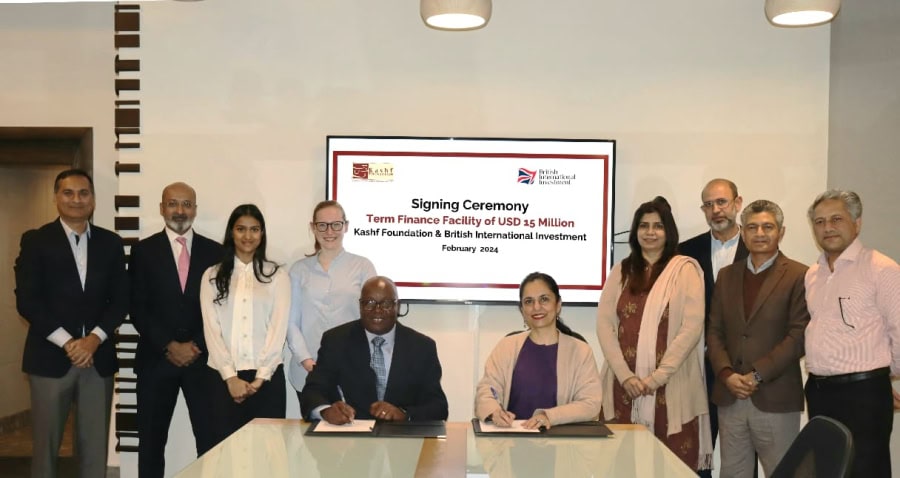Today, both British International Investment (BII), the UK’s development finance institution and impact investor, and Finnfund announced their continuing support to Kashf Foundation (Kashf), one of the leading microfinance institutions in Pakistan. BII has committed $15 million US dollars while Finnfund has committed $10 million US dollars as follow on investments.
In 2021, Finnfund and BII made their initial investment in Kashf. Since then, Kashf has grown to become the largest distributor of microinsurance solutions in Pakistan and also introduced health insurance products aimed at underserved women who did not have access to insurance before.
Pakistan has one of the lowest financial inclusion rates in the world, with 79% of its 231 million people operating outside of the formal banking system, according to World Bank’s Global Findex Database. Only 13% of Pakistani women have bank accounts, compared to 28% of men.
Most low-income households in Pakistan lack access to formal safety nets and are highly vulnerable to shocks such as the death of the head of the household, an illness, or a disease.
The foundation currently serves over 750,000 customers and over 70 per cent of its loans are deployed to micro-enterprises owned by women. Its services are offered via over 380 branches and the target is to grow the network to 450 in two years supported by the BII-Finnfund facility.
Roshaneh Zafar, Managing Director of Kashf Foundation, said: “Investing in women’s economic empowerment not only enhances their earning potential but also has far-reaching effects on their families and communities. When women succeed in generating income, they often prioritize education for their children, thus laying the groundwork for future generations. This creates a positive cycle of empowerment that reshapes gender dynamics and fosters stronger communities. Moreover, ensuring access to health insurance through social safety nets is essential from a woman’s perspective, ensuring their well-being and contributing to overall societal stability.”
Habib Yousuf, Regional Director for South Asia at BII said: “Access to finance for micro-enterprises in Pakistan has increasingly become more difficult given local macroeconomic challenges. It is even more challenging for underbanked women-owned businesses. As UK’s DFI, BII is proud to continue to provide much needed funding alongside Finnfund to Kashf for financing female business owners which is also aligned with the government’s priority of reducing gender inequality in financial services.”
“Kashf has successfully built a distinct and unique niche for itself in the microfinance sector,” said Finnfund’s Investment Manager Antti Partanen. “Since we started our partnership in 2021, we have been impressed by the impact of both the financial and non-financial services that Kashf offers and with the addition of insurance products, they can now further strengthen the safety nets of low-income households and especially those of women.”
Kashf is committed to the internationally recognised Client Protection Principles and universal standards for social performance management and is working towards the gold-level certification.
Kashf’s financial services, based on the mentioned principles, include appraisal-backed individual lending along with non-financial services to have a transformative impact at the household level. Non-financial services include capacity building by offering skills development training to understand the products and services customers commit to.
Kashf has trained more than 300,000 women microentrepreneurs in financial management training sessions. Training is also provided to young girls to enable the next generation of women micro-entrepreneurs through improved financial management skills and self-confidence in their daily lives.
Addressing climate change impacts is equally important as underserved groups including women are more severely impacted by natural disasters and extreme weather events. As an initial step, Kashf is developing a Climate Risk Policy that outlines its approach to identify and manage climate risks. BII is providing technical assistance to Kashf to help develop and implement this policy and a risk management framework, as well as in designing new products to increase climate resilience of Kashf clients.
The investment qualifies as a 2X compliant gender lens investment as Kashf Foundation mainly serves female customers and also strongly promotes women’s employment and leadership in their organisation.










